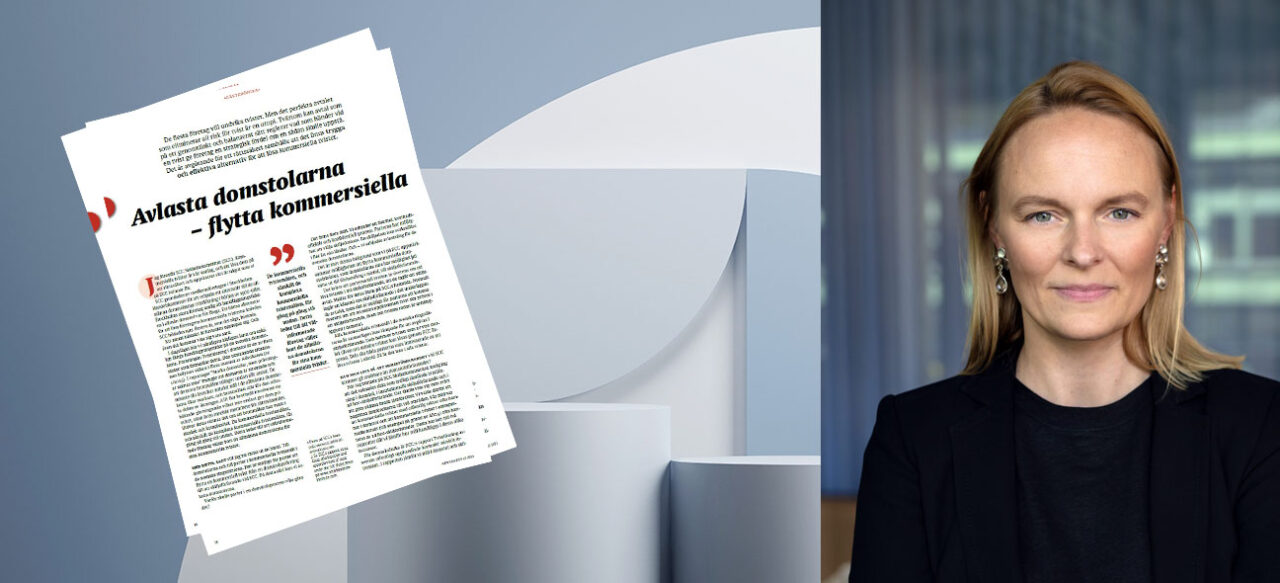Relieve the Swedish courts – move commercial disputes to arbitration
As processing times in Swedish courts continue to rise, SCC Secretary General Caroline Falconer shares in the Swedish newspaper Advokaten why SCC arbitration offers a timely and effective alternative for resolving commercial disputes. In her guest column, Falconer highlights how arbitration at the SCC can ease the burden on the courts while providing businesses with a flexible, cost-efficient, and confidential process – often delivering quicker outcomes than traditional litigation. Read the key takeaways from her column and discover how parties can transfer ongoing disputes to SCC arbitration.
Published

SCC Arbitration Institute plays a crucial role in offering an alternative to the lengthy processes of general courts for resolving commercial disputes. Founded by the Stockholm Chamber of Commerce in 1917, the SCC was established to provide a more efficient option for dispute resolution, as large companies in Stockholm found the general courts’ processing times too long.
Currently, there are significant concerns about the long processing times in Swedish courts, with commercial litigation often being sidelined due to the increase in complex criminal cases. The Swedish not-for-profit association Dispute Resolution in the Courts (Sw. Tvistlösning i domstol) is one of those who highlights this issue, noting that judges are stressed and major criminal cases are taking precedence, leading to a significant increase in the number of cases in general courts over the past decade.
The SCC invites parties involved in commercial disputes to transfer their cases from court to SCC arbitration. This proposal aims to alleviate the burden on courts while offering benefits such as a flexible, cost-effective, and confidential process. Parties can choose their arbitrator, and an arbitral award can be enforced in over 160 countries.
Parties can agree to enter into an arbitration agreement even if the dispute is already pending in court. Templates for such agreements are available on the SCC website. While an arbitration clause is typically included in the underlying agreement, parties can still agree to arbitrate a dispute that has already arisen.
Not all commercial disputes being heard in Swedish district courts are suitable for arbitration. The dispute must be significant, and both parties must be willing to resolve it promptly. Smaller disputes can be resolved through SCC Express.
Can you imagine that the arbitration procedure at the SCC will be faster than the court procedure? When I joined the SCC Arbitration Institute, I realised that there was a lack of data that clearly compared dispute resolution in court, in institutional arbitration, and in ad hoc arbitration. It would prove difficult to make such broad comparisons. We therefore chose to limit the comparisons to two areas. Our view was that commercial disputes with the public sector often end up in court, and that commercial disputes in construction contracts (e.g., due to AB 04) are often handled by ad hoc arbitration tribunals. This has led to two of the SCC’s reports comparing how cases are handled by these different bodies.
The SCC report Dispute Resolution in Public Procurement Contracts in particular highlights that arbitration can be a quicker alternative to court proceedings for commercial disputes. The report compares court cases and arbitration disputes, focusing on publicly tendered contracts. It analyzed 31 cases administered at the SCC and 39 cases in court, examining factors such as dispute value, time taken, and settlements.
Initially, we noted that public actors had used all the different dispute resolution methods offered by the SCC: arbitration, expedited arbitration, emergency arbitrator, SCC Express, and mediation. When we compared the time taken, it turned out that cases administered by the SCC were decided in less time. The average duration of a dispute in SCC arbitration is shorter than in court. At the SCC, the average duration of a case, including any appeal process, was just over 17 months, and the median was just under a year. These cases had an average disputed value of SEK 280 million, significantly higher than the average disputed value in general courts, SEK 13 million. On average, it took 22.9 months from the filing of the application to the judgment in the general court. These disputes can be compared with the simplified arbitration procedures at the SCC, which took 6.6 months on average and concerned approximately SEK 9 million. We also analysed the incidence of settlements in these cases. About one third of SCC cases were settled and this was done on average 15.1 months after the case was opened, 7.6 months at the median. On average, two thirds of cases were settled in the courts. On average, settlements were reached after about 19 months. Thus, settlements are reached at a late stage in court proceedings.
Concerns about arbitration often focus on cost and confidentiality. However, litigation involves costs regardless of the venue, with the main expense being the parties’ counsel fees. In SCC arbitration, this cost is typically around 80% of the total. A shorter process generally results in lower costs. For instance, a commercial dispute involving €10 million is less costly if resolved in 6 months through simplified arbitration than in 23 months in court, despite additional fees to the arbitration institute and Arbitral Tribunal. Regarding confidentiality, parties can agree on the level of confidentiality, deciding whether to publicize proceedings.
In conclusion, parties are encouraged to consider transferring ongoing commercial disputes to SCC arbitration. This supports the courts during challenging times and offers a more efficient resolution process. The ability to settle disputes in arbitration is crucial for business growth, and interested parties are welcome to contact the SCC for more information.
Please find the guest column in Swedish here.